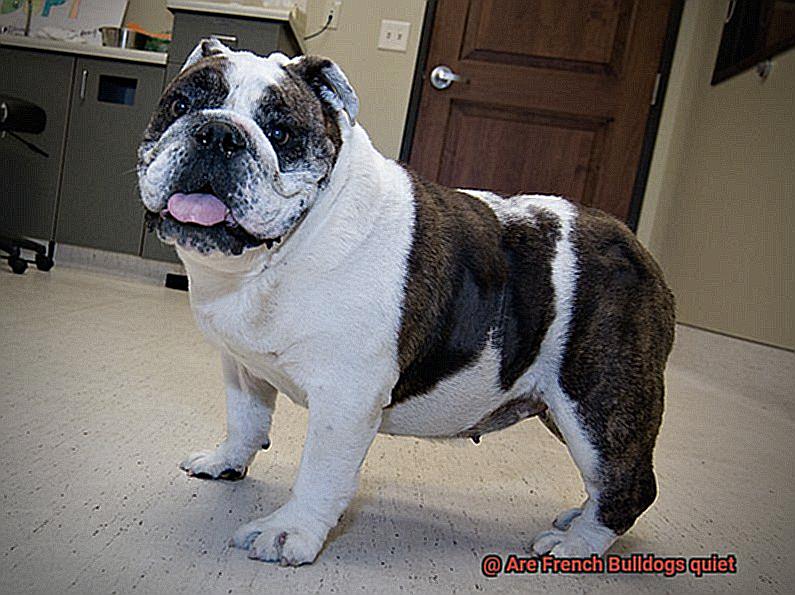Are French Bulldogs quiet?
Thinking about bringing a new furry friend into your home? Look no further than the irresistibly charming French Bulldog. With their adorable squishy faces and playful personalities, these little pups have a way of stealing hearts. But what about noise levels? Are French Bulldogs as calm and collected as they seem? Join us on this journey into the world of French Bulldogs, where we’ll explore their unique traits and uncover the truth about their quietness – or lack thereof.
Whether you’re in need of a low-key buddy for apartment living or seeking a peaceful companion for those long nights of Netflix binging, let’s find out if a French Bulldog is the perfect match for your noise-conscious lifestyle.
Exploring the Low-Energy Nature of French Bulldogs
Contents
- 1 Exploring the Low-Energy Nature of French Bulldogs
- 2 The Affectionate and Sociable Nature of French Bulldogs
- 3 Breeding History and Its Impact on French Bulldog Temperament
- 4 Understanding Your Dog’s Vocalizations
- 5 Common Reasons Why French Bulldogs Bark
- 6 Training Your French Bulldog to be Quieter
- 7 Tips for Reducing Excessive Barking in French Bulldogs
- 8 How to Create a Calm Environment for Your French Bulldog
- 9 Conclusion
One characteristic that sets them apart from other breeds is their low-energy nature. In this blog post, we will delve into the fascinating world of French Bulldogs’ exercise needs, exploring how their calm demeanor impacts their activity levels and offering tips for keeping them happy and healthy.
The Calm and Contented French Bulldog:
French Bulldogs are famously known for their calm, relaxed, and contented nature. Unlike some high-energy breeds, they are perfectly suited for apartment living or households where owners may not have ample time for intense exercise routines.
Exercise: Quality Over Quantity:
While French Bulldogs don’t require extensive daily walks or rigorous workouts, it’s essential to provide them with regular exercise to maintain a healthy weight and prevent obesity. Short walks, playtime, and mental stimulation activities are usually sufficient to keep them engaged and satisfied.
Tailoring Exercise to Individual Needs:
Each French Bulldog has unique energy levels influenced by factors such as age, health condition, and temperament. Some may be more energetic as puppies but gradually become more relaxed with maturity. Assessing your furry friend’s specific needs is crucial to strike the right balance between enough exercise and avoiding overexertion.
Keeping Them Cool and Safe:
Due to their short-nosed structure, French Bulldogs are more susceptible to overheating and respiratory issues. It’s vital to avoid overexerting them in hot weather and provide plenty of water breaks during exercise. Opt for early morning or late evening walks when temperatures are cooler.
Beyond Physical Exercise: Mental Stimulation Matters:
While physical exercise is important, mental stimulation is equally crucial for a French Bulldog’s overall well-being. Engage their clever minds with interactive toys, puzzle games, and training exercises to keep them mentally sharp and content.
The Affectionate and Sociable Nature of French Bulldogs
French Bulldogs are beloved for their affectionate and sociable nature, making them the perfect companions for families and individuals alike. Let’s explore why these dogs are known for their loving and friendly personalities.

Bred for Companionship
French Bulldogs were originally bred in England as companion dogs for lace workers. Their small size and friendly temperament made them ideal lap dogs, providing comfort and companionship to their owners. This breeding history has shaped their affectionate nature, as they thrive on human connection and love to be a part of the family.
Natural Instinct for Affection
French Bulldogs have a natural instinct to seek human attention and affection. They will often follow their owners from room to room, always wanting to be by their side. Their loyalty and devotion make them excellent companions, providing endless love and support.
Great with Children
French Bulldogs are known to be patient and gentle with children, making them a popular choice for families. They can handle the energy that comes with having young kids around and are tolerant of rough play. However, it’s important to supervise interactions to ensure the safety of both the dog and the child.
Get Along with Other Pets
French Bulldogs typically get along well with other pets, including cats, dogs, and smaller animals like rabbits or guinea pigs. They are not usually aggressive towards other animals and can coexist peacefully. Proper introductions are necessary to ensure a smooth transition.
Sociable by Nature
French Bulldogs are naturally sociable dogs who enjoy meeting new people. They are typically friendly towards strangers, which makes them great candidates for therapy or emotional support work. Their ability to connect with and comfort people is unparalleled.
Breeding History and Its Impact on French Bulldog Temperament
These adorable little creatures have captured the hearts of many with their playful antics and undeniable charm. But have you ever wondered why French Bulldogs are known for their friendly and sociable nature? Well, my friend, the answer lies within their breeding history. Join me as we delve into the fascinating world of French Bulldog temperament and how their breeding past has shaped who they are today.
A Journey Back in Time
Picture this: it’s the 1800s, and English lace workers are toiling away at their craft. To keep them company during long hours of work, small bulldogs were bred as loyal companions. These tiny bundles of joy quickly stole the hearts of their owners with their affectionate and gentle nature.
The Arrival in Paris
Word of these delightful companions soon spread across the English Channel to France. The French elite couldn’t resist the charm of these pint-sized bulldogs, and so began the love affair between the French and what we now know as French Bulldogs. With time, breeders in France refined the breed, molding them into the lovable and distinctive dogs we see today.
The Impact on Temperament
The breeding history of French Bulldogs has had a profound impact on their temperament. Bred as companions, they were carefully selected for their sociable nature and gentle disposition. These traits were essential for a dog that would spend its days providing comfort and companionship to lace workers or adorning the laps of the French elite.
Breeding Practices and Variances
While the majority of French Bulldogs exhibit friendly and sociable temperaments, it is important to note that there can be variations within the breed. Irresponsible breeding practices, fueled by the breed’s popularity, have led to some French Bulldogs exhibiting temperament issues such as aggression or excessive shyness. This highlights the importance of choosing a reputable breeder who prioritizes temperament when selecting parent dogs.
Nurturing the Gem: Socialization and Training
Even the most well-bred French Bulldog can benefit from early socialization and training. Exposing them to different environments, people, and animals from a young age helps shape their temperament, ensuring they grow into well-adjusted and well-behaved dogs. So, make sure to give your furry friend plenty of opportunities to explore the world around them.
Understanding Your Dog’s Vocalizations
Dogs are known for their ability to communicate through a variety of vocalizations. French Bulldogs, like other dog breeds, have their unique ways of expressing themselves through these vocalizations. Understanding your French Bulldog’s vocalizations is essential for effective communication and meeting their needs.
Types of Vocalizations:
Barking:
French Bulldogs are notorious for their tendency to bark. This can be a sign of alertness, fear, boredom, or excitement. To identify the meaning behind your French Bulldog’s barking, pay attention to the context and accompanying body language. For example, if your Frenchie barks when someone approaches the door, it could be an alert bark. If they bark during playtime, it might be an expression of excitement.
Growling:

Growling is a warning sign that dogs use when they feel threatened or uncomfortable. French Bulldogs may growl when they are guarding their resources or feeling anxious. It’s important to respect their boundaries when they growl and avoid pushing them further into distress. If your Frenchie’s growling becomes excessive or aggressive, seek professional help.
Howling:
While howling is more commonly associated with certain breeds like Huskies, some French Bulldogs may also howl occasionally. Howling is often a response to certain triggers or as a way to communicate over long distances. Excessive howling may indicate underlying issues that require attention and training.
Whimpering and Whining:
French Bulldogs may whimper or whine to express various emotions such as pain, anxiety, or seeking attention. Differentiating between attention-seeking whining and genuine distress requires observation and understanding of your Frenchie’s body language and overall behavior.
Understanding Individual Differences:
While certain vocalizations may be common among French Bulldogs, it’s important to remember that each dog is unique, and their vocalizations may vary. Spend time observing and understanding your own French Bulldog’s specific vocalizations and body language to better communicate with them.
Communication and Training:
Effective communication between owners and their French Bulldogs is crucial. Positive reinforcement training methods are highly recommended to encourage desired behaviors and discourage excessive or inappropriate vocalizations. Consistency, patience, and understanding are key when training a French Bulldog.
Common Reasons Why French Bulldogs Bark
French Bulldogs are often praised for their calm and well-behaved nature. While they are generally a quiet breed, it’s important to understand that individual dogs can have their own unique personalities and may vary in their behavior and vocalization. In this blog post, we will explore why French Bulldogs are known for being quiet, but not completely silent.
Reason 1: Low Energy Levels
One of the reasons why French Bulldogs are generally quiet is their relatively low energy levels. Unlike some other breeds that are more prone to excessive barking, French Bulldogs are content with moderate exercise and enjoy lounging around the house. Their lower energy level often translates to less barking and noise, making them a great choice for those seeking a quieter companion.
Reason 2: Affectionate and Sociable Nature
French Bulldogs are known for their affectionate and sociable nature. They thrive on human companionship and enjoy being in the company of their owners. This strong bond and sense of security contribute to their overall calm demeanor and reduced tendency to bark excessively. When they feel loved and secure, they are less likely to engage in excessive vocalization.
Reason 3: Breeding History
French Bulldogs were initially bred as companion dogs, specifically to be calm and well-behaved indoor pets. Their ancestors, the English Bulldogs, were also bred for similar traits. As a result, French Bulldogs have inherited a more laid-back temperament that is conducive to a quieter lifestyle. Their breeding history plays a significant role in shaping their behavior and reducing excessive barking tendencies.
Training Your French Bulldog to be Quieter
French Bulldogs may be known for their calm and well-behaved nature, but just like any dog, they can sometimes become vocal and make excessive noise. Whether it’s barking at the doorbell or howling at unfamiliar sounds, training your French Bulldog to be quieter is possible with the right techniques. In this guide, we’ll explore how positive reinforcement can help you achieve a quieter household while maintaining a loving and respectful relationship with your furry friend.
Identify Triggers:
Start by identifying the specific triggers that cause your French Bulldog to bark excessively or make loud noises. It could be anything from strangers, other animals, or certain sounds. Once you know the triggers, you can work on desensitizing your dog to them.
Positive Reinforcement:
Positive reinforcement is a powerful tool in dog training. By rewarding desired behaviors, you can encourage your French Bulldog to remain calm in situations that would typically trigger excessive barking. Use treats, praise, and rewards to reinforce their quiet behavior.
Teach the “Quiet” Command:
Teaching your French Bulldog the “quiet” or “enough” command can be highly effective. Start by saying the command when your dog starts barking and then reward them when they stop. Gradually increase the duration of silence before offering a reward. With consistent practice, your dog will learn to associate the command with being quiet.
Avoid Punishment:
Punishing or yelling at your French Bulldog for barking excessively is not recommended. This can create anxiety or fear in your dog and may worsen their behavior. Instead, focus on positive reinforcement and redirecting their attention to more appropriate behaviors.
Provide Mental and Physical Stimulation:
A bored dog is more likely to engage in excessive barking. Provide mental and physical stimulation for your French Bulldog by offering plenty of toys to keep them occupied and engaging them in regular exercise and playtime. A tired dog is often a quieter dog.
Seek Professional Help:
If your French Bulldog’s excessive barking persists despite your efforts, it may be beneficial to seek professional help from a dog trainer or behaviorist. They can provide personalized guidance and strategies to address the specific needs of your dog.
Tips for Reducing Excessive Barking in French Bulldogs

French Bulldogs are adorable, lovable, and known for their friendly nature. However, like any dog breed, they can sometimes bark a bit more than we’d like. Excessive barking can be frustrating for both you and your neighbors, but fear not. We’ve got some handy tips to help reduce your French Bulldog’s barking and create a more peaceful environment for everyone.
Get Moving, Get Calm:
French Bulldogs are active dogs, and a tired dog is a quiet dog. Make sure your furry friend gets enough exercise every day through walks or playtime. This will help burn off their excess energy and keep them more relaxed, resulting in less barking.
Mental Stimulation Matters:
Keeping your French Bulldog’s mind engaged is just as important as physical exercise. Invest in puzzle toys or interactive feeders that require them to work for their treats. Mental stimulation helps prevent boredom, which can lead to excessive barking.
Teach the “Quiet” Command:
Training your French Bulldog to understand the command “quiet” can be a game-changer. Start by saying “quiet” when they bark and rewarding them with treats when they stop. With consistent practice, they’ll learn that being quiet is a good thing.
Address Anxiety and Fear:
Sometimes barking can stem from anxiety or fear. If you’ve ruled out any medical conditions, consider consulting a professional dog trainer or behaviorist who can help identify the root cause of your Frenchie’s anxiety and provide effective techniques to manage it.
Create a Safe Haven:
French Bulldogs thrive in a calm environment. Designate a cozy spot in your home where they can retreat and feel safe when they need some downtime. Add their favorite toys or blankets to make it even more inviting.
Avoid Reinforcing Barking:
It’s important not to unintentionally reward your French Bulldog’s barking behavior. Refrain from giving them attention or treats when they bark excessively, as this can reinforce the idea that barking gets them what they want. Instead, wait for a moment of calm and reward that behavior.
How to Create a Calm Environment for Your French Bulldog
Creating a calm environment for your French Bulldog is essential for their overall well-being and happiness. These adorable dogs can be prone to anxiety, so it’s important to provide them with a peaceful and serene space where they can relax and feel safe. Here are some tips and tricks to help you create the perfect haven for your furry friend.
Designate a Quiet Space:
Setting aside a specific area in your home where your French Bulldog can retreat to when they need some peace and quiet is crucial. This could be a cozy corner of a room or a comfortable crate with their favorite toys and a soft bed. Ensure that this space is away from any loud noises or distractions, providing them with a calm sanctuary.

Soothing Sounds:
Playing soft, calming music or using white noise machines can help create a tranquil atmosphere for your French Bulldog. There are even specially curated playlists available that are designed to relax dogs. The gentle sounds can drown out any external noises that may cause anxiety, providing a soothing environment for your furry friend.
Establish a Routine:
French Bulldogs thrive on routine, so establishing a consistent daily schedule is vital. Set regular feeding times, exercise sessions, and designated quiet times for relaxation. A predictable routine helps dogs feel secure and reduces their stress levels, creating a sense of calmness in their lives.
Aromatherapy:
Certain scents have calming effects on dogs. Consider using aromatherapy to create a serene environment for your French Bulldog. Lavender, chamomile, and valerian essential oils are known for their relaxing properties. However, it’s important to consult with a veterinarian before using any aromatherapy products to ensure they are safe for your dog.
Mental Stimulation:
To prevent boredom-induced anxiety, provide your French Bulldog with plenty of mental stimulation throughout the day. Interactive toys, puzzle feeders, and training sessions can keep their minds engaged and distract them from potential stressors. Mental exercise is just as important as physical exercise for a calm and contented dog.
Em5WE9QFfa0″ >
Conclusion
In conclusion, it is safe to say that French Bulldogs are indeed quiet companions.
Their calm and composed nature makes them ideal for individuals or families seeking a peaceful living environment. With their minimal barking tendencies, they won’t disturb the tranquility of your home or neighborhood.
Whether you live in an apartment or a house, you can rest assured that a French Bulldog will not be the cause of noise complaints.




